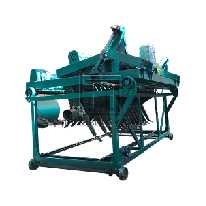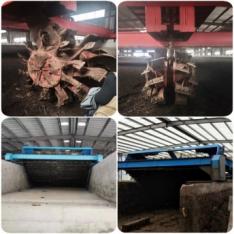Double Roller Press Granulator
The double roller press granulator is an advanced fertilizer production machine that utilizes the extrusion principle to convert various materials into high-quality granules. With its unique design and reliable performance, this granulator offers numerous benefits in the field of fertilizer manufacturing.
Working Principle:
The double roller press granulator operates on the principle of extrusion. The raw materials are fed into the granulator through a feeding hopper. Inside the granulator, two counter-rotating rollers exert pressure on the materials. As the materials pass through the gap between the rollers, they undergo plastic deformation and are compacted into dense granules. The compacted granules are then sieved and discharged through the outlet.
Advantages of the Double Roller Press Granulator:
High Granulation Efficiency: The double roller press granulator provides excellent granulation efficiency due to its powerful extrusion force and adjustable pressure. The uniform pressure applied to the materials ensures consistent granule size and density, resulting in high-quality fertilizer products.
Versatile Application: This granulator is capable of processing various materials, including ammonium sulfate, ammonium chloride, ammonium phosphate, NPK fertilizers, and other organic and inorganic substances. It allows for flexibility in formulating custom fertilizer blends to meet specific crop nutrient requirements.
Environmentally Friendly: The double roller press granulator minimizes material loss and dust emission during the granulation process. With its compact design and enclosed structure, it effectively controls environmental pollution and reduces resource waste.
Enhanced Nutrient Availability: The granules produced by the double roller press granulator have a smooth surface and compact structure, which reduces nutrient loss through volatilization and leaching. This ensures that the nutrients are released slowly and steadily, promoting efficient nutrient absorption by plants.
Applications of the Double Roller Press Granulator:
Agricultural Fertilizer Production: The double roller press granulator is widely used in agricultural fertilizer production. It can process various raw materials into granules, such as compound fertilizers, organic fertilizers, and bio-organic fertilizers. These granules provide balanced nutrient content for crops, improving soil fertility and promoting healthy plant growth.
NPK Fertilizer Manufacturing: The double roller press granulator is particularly suitable for the production of NPK (nitrogen, phosphorus, and potassium) fertilizers. It enables the precise blending of these essential nutrients in the desired ratios, ensuring optimal nutrient availability for different crops and soil conditions.
Specialized Fertilizer Production: This granulator is also used in the production of specialized fertilizers, including slow-release fertilizers, controlled-release fertilizers, and water-soluble fertilizers. By adjusting the pressure and roller speed, the granulator can create granules with specific properties, such as extended release periods or high solubility.
Fertilizer Pelletizing for Export: The double roller press granulator is well-suited for pelletizing fertilizers for export. The uniform size and shape of the granules make them easy to handle, transport, and apply. This ensures efficient and accurate fertilization in large-scale agricultural operations.
The double roller press granulator is a highly efficient machine for fertilizer production. Its extrusion principle allows for the conversion of various raw materials into high-quality granules with consistent size and density. With advantages such as high granulation efficiency, versatility, environmental friendliness, and enhanced nutrient availability, this granulator finds extensive applications in agricultural fertilizer production, NPK fertilizer manufacturing, specialized fertilizer production, and export pelletizing. By utilizing the double roller press granulator, fertilizer manufacturers can achieve efficient production processes and contribute to sustainable agriculture practices.







